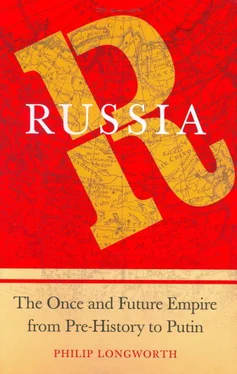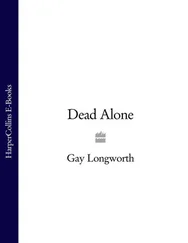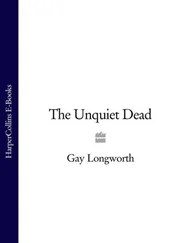In May 2003 Russia, Kazakhstan, Kyrgyzstan and Tajikistan, as well as Belarus and Armenia, agreed to set up a collective security organization with headquarters in Moscow, a rapid-reaction force for Central Asia under Russian command, and a common air-defence system. They also agreed to co-ordinate foreign policy and security. 8The Collective Rapid Deployment Force was set up within a year, and, in return for rescheduling part of that country’s sizeable debt, 9Russia also obtained a permanent lease on a military air-base at Kant in Kyrgyzstan, at the heart of the region and within range of Afghanistan, Pakistan, India and China.
Russo-Chinese relations since the collapse have prospered. Trade between the two countries almost tripled during Putin’s first term. Both powers are involved together with three Central Asian states in the ‘Shanghai Forum’, and their common interests include anti-terrorism and counter-insurgency (China approves of Moscow’s policy in Chechnya, Russia of Chinese policy in Taiwan and Tibet), international conflict management, and Iraq. China implicitly recognizes Russia’s leading role in Central Asia. Divergent interests may divide them in future, but for the moment the Russo-Chinese entente holds. 10Furthermore, as in the Soviet period, relations with India are good, and India remains a major importer of Russian arms and military technology. In Asia, then, Russia’s power and influence have been growing again.
The United States is the world’s only superpower, but even a superpower’s ability to control territory and peoples has its limitations, as the intervention in Iraq has demonstrated. Russia lacks the strength to challenge America in the foreseeable future, yet nothing is immutable. The world changes, and the strategic order will change with it. Russia has begun to recover. Its military capability is considerable albeit much reduced, and its tradition of careful diplomacy based on superior intelligence, realism and understanding of other cultures gives it advantages which others lack, and will stand it in good stead. History provides no sure guide of things to come, but, as I write in September 2004, it would be unwise to write off Russia’s chances of future power.
| Date |
Geology/climate and selected events in European/world history |
Russian history and imperial development |
| Before present |
| 20,000-26,000 |
Age of mammoths |
Sungir remains |
| 24,000 |
Onset of the Ice Age |
- |
| 7,000-8,000 |
Global warming; ice retreats |
Aspen, birch, hazel, willow, hornbeam, linden, oak, elm, etc. Animals, wildfowl |
| 6,000 |
Palaeolithic era |
Agriculture and animal husbandry |
| 4,000 |
Babylonia |
Tripolye settlements |
| 3,500 |
- |
Hunter-gatherers in Finland |
| 3,000 |
Iron Age |
Swidden agriculture |
| Persian Empire |
Cimmerians, Scythians, Sarmatians |
| Alexander the Great |
| 2,000 |
Roman Empire |
- |
| Common Era (CE) |
| 330 CE |
Constantine the Great founds Constantinople |
Khazar kaganate |
| c. 650- |
Spread of Islam: Baghdad Caliphate |
- |
| c. 856 |
- |
Riurik at Ladoga |
| 858 |
- |
Askold and Dir take Kiev |
| 860 |
Vikings raid Constantinople |
- |
| 882 |
Alfred the Great |
Oleg defeats Askold and Dir |
| Khazar hegemony over Kiev |
| c. 955 |
- |
Olga visits Constantinople |
| Sviatoslav conquers Khazars |
| Christianization of Rus |
| Vladimir builds St Sofia in Kiev |
| Iaroslav the Wise (d. 1054) |
| 1066 |
Normans conquer England |
- |
| 1068 |
- |
Rus defeated by Polovtsians (Cumans) |
| 1113 |
- |
Vladimir Monomakh, Prince of Vladimir-Suzdal |
| 1204 |
Crusaders sack Constantinople |
- |
| 1232 |
- |
Baty Khan routs Russians Mongol era begins |
| 1240 |
- |
Collapse of Kievan Rus |
| Alexander Nevskii beats off Swedes and German Knights |
| c. 1300 |
- |
Rise of Vladimir-Moscow |
| 1325 |
- |
Metropolitan of Kiev moves to Moscow |
| 1331 |
- |
Ivan I (Money-Bag) becomes grand prince |
| 1380 |
- |
Dmitrii defeats Tatars at Kulikovo |
| 1400 |
- |
St Sergius. Monastic colonization |
| 1413 |
Treaty of Horodlo |
Catholicization in Lithuania |
| 1425 |
Growth of Inca Empire |
Vasilii II |
| 1441 |
Council of Ferrara |
Ivan III (the Great) |
| Louis XI of France |
| 1453 |
Constantinople falls to Turks |
Novgorod subjected to Moscow |
| Lorenzo de’ Medici |
| Henry the Navigator |
| 1472 |
- |
Ivan III m. Zoe Palaeologue |
| 1485 |
Henry VII of England |
- |
| Aztec Empire |
| 1547 |
- |
Ivan IV (the Terrible) |
| 1550 |
Spain and Portugal build empires |
Law book issued |
| Kazan captured |
| First Russian outposts in Caucasus |
| Conquest of Siberian khanate |
| Livonian war |
| English merchants discover Russia |
| Archangel established |
| Boris Godunov |
| 1601 |
Onset of Little Ice Age |
Mangazeia founded |
| 1605 |
- |
Russia in turmoil |
| Collapse of Muscovite state |
| Pretender Dmitrii takes Moscow |
| 1606 |
- |
Swedes invade |
| 1612 |
- |
Moscow recaptured |
| 1613 |
- |
Michael Romanov crowned tsar |
| 1630-31 |
- |
War with Poland Smolensk recaptured |
| 1648 |
Fronde in France |
Dezhnev reaches Pacific |
| English Civil War |
Ukrainian Cossacks rebel against Polish rule |
| 1654 |
- |
War with Poland |
| Ukrainian Cossacks submit to Tsar Alexis |
| 1660 |
Restoration of monarchy in England |
- |
| 1667 |
- |
Peace of Andrusovo: Russia gains eastern Ukraine |
| 1676 |
- |
Death of Alexis, accession of Fedor |
| 1689 |
- |
Treaty of Nerchinsk with China |
| 1689-1725 |
- |
Peter I (the Great) |
| Great Northern War |
| 1703 |
- |
Foundation of St Petersburg |
| 1709 |
- |
Russians rout Swedes at Poltava |
| 1711 |
- |
Russians defeated by Turks on river Pruth |
| 1716 |
- |
Orenburg Line begun (base for future expansion into Central Asia) |
| Annexation of Baltic states |
| 1724 |
- |
War with Persia |
| 1725 |
- |
Catherine I |
| 1726 |
- |
Alliance with Habsburg Emperor |
| 1727 |
- |
Peter II |
| 1730 |
- |
Anna Iovanovna |
| 1741 |
- |
Elizabeth Petrovna |
| 1756-63 |
- |
Seven Years War |
| 1761 |
- |
Peter III |
| 1762 |
- |
Catherine II |
| 1769-73 |
American Revolution |
War with Turks |
| First partition of Poland |
| 1783 |
- |
Annexation of Crimea |
| 1787-93 |
French Revolution |
War with Turks |
| 1793 |
- |
Second partition of Poland |
| 1795 |
Revolutionary Wars |
Third partition of Poland |
| 1800 |
Napolean |
A Russian fleet enters the Mediterranean |
| 1803 |
- |
A Russian ship circumnavigates the globe |
| 1808 |
- |
Finland annexed |
| 1811 |
- |
Bessarabia annexed |
| 1812 |
- |
Russia invaded by Napoleon’s Grande Armée |
| 1815 |
Waterloo |
Russian troops in Paris |
| 1820s |
- |
War in Chechnya |
| Russia sponsors Greek independence |
| 1828-9 |
- |
Russians take Tabriz and Erzurum |
| Russia penetrates Central Asia and Far East; gains access to Mediterranean |
| Russia sponsors autonomous Serbia |
| Russian colonization of Alaska |
| 1837-1901 |
Queen Victoria |
- |
| 1853-6 |
- |
Crimean War |
| 1864 |
American Civil War |
Russians take Chimkent |
| 1865 |
- |
Samarkand |
| 1873 |
- |
Khiva, Kokand |
| 1877-8 |
- |
War with Turks |
| Russia sponsors Bulgarian independence |
| Railway-building |
| 1885 |
Heyday of British Empire |
Russians defeat Afghans at Pendjeh |
| 1890s |
- |
Russia industrializes |
| Trans-Siberian Railway |
| 1896 |
- |
Russia—China accord |
| 1904 |
- |
War with Japan |
| 1905 |
- |
Battle of Tsushima |
| 1914-18 |
First World War |
- |
| 1917 |
- |
Nicholas II abdicates; end of Romanov Empire |
| Bolsheviks remove Provisional Government |
| 1918- |
- |
Civil War |
| War with Poland |
| Loss of Baltic states, Ukraine, etc. |
| 1924 |
- |
Death of Lenin; power gravitates to Stalin |
| 1928-9 |
Great Depression |
Stalin launches Collectivization and first Five-Year Plan |
| 1933 |
Hitler in power in Germany |
- |
| 1934-8 |
- |
Purges and show trials |
| 1938 |
Munich Agreement |
- |
| 1939 |
Second World War begins in West |
- |
| 1940 |
- |
Occupation of Baltic states |
| 1941 |
Pearl Harbor; US enters WWII |
Hitler invades Soviet Union |
| 1942 |
- |
Battle of Stalingrad |
| 1943 |
- |
Battle of Kursk; Germans in retreat |
| 1944 |
Invasion of Normandy |
Yalta Conference |
| 1945 |
Atomic bomb dropped on Japan |
Soviet forces take Berlin |
| Potsdam agreement |
| 1947 |
Marshall Plan Onset of the Cold War |
Soviet Bloc formed |
| Chinese Communists defeat Nationalists |
| 1949 |
- |
Soviet Union acquires atom bomb; breach with China |
| 1953 |
- |
Death of Stalin |
| 1954 |
- |
COMECON becomes active |
| 1955 |
- |
Warsaw Pact |
| 1956 |
- |
Soviet intervention in Hungary |
| 1959 |
- |
Cuba aligns with Moscow |
| 1961 |
- |
Soviet Union puts first astronaut into space |
| 1964 |
- |
Brezhnev replaces Khrushchev |
| 1968 |
- |
Soviet intervention in Czechoslovakia |
| 1979 |
- |
Soviet intervention in Afghanistan |
| 1982 |
- |
Andropov becomes Party Secretary |
| 1984 |
- |
Death of Andropov; Chernenko succeeds him |
| 1985 |
- |
Death of Chernenko; Gorbachev becomes Party Secretary; detente with West |
| 1986 |
- |
Chernobyl disaster |
| 1988-91 |
Reunification of Germany |
Collapse of Bloc |
| Dissolution of Soviet Union |
| 1992 |
- |
Yeltsin as Russian president |
| Catastrophic decline |
| Russia reverts to frontiers of c. 1650 |
| 1994-6 |
NATO extends eastward |
First Chechen War |
| US warships enter Black Sea |
| 2000 |
- |
Putin becomes president |
| Reassertion of Russian interests |
| Economic recovery |





![Stephan Orth - Behind Putin's Curtain - Friendships and Misadventures Inside Russia [aka Couchsurfing in Russia]](/books/415210/stephan-orth-behind-putin-s-curtain-friendships-a-thumb.webp)





